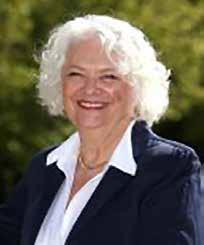




THE POLITICAL LANDSCAPE IN NEVADA AND ACROSS THE United States is undergoing a notable transformation. A growing number of voters are moving away from traditional party affiliations, embracing independent status and signaling a desire for pragmatic, solutionoriented leadership. This shift is reshaping electoral outcomes, influencing policy priorities, and compelling elected officials to recalibrate their approaches. In Nevada, these changing voter dynamics present both challenges and opportunities for political leaders, businesses, and advocacy groups like the Retail Association of Nevada (RAN), who must navigate an increasingly complex political environment.
As of September 2024, approximately 36 million registered Republicans were recorded in the United States, based on statereported party affiliation data. Another estimate places the number at 38.8 million, reflecting slight
By Mary Lau, RAN CEO

variations in reporting methods. These figures represent a significant portion of the 186.5 million registered voters nationwide. Concurrently, there were approximately 32.1 million registered voters identifying as independents, undeclared, or having no party affiliation. This accounts for 17% of all registered voters in states permitting party affiliation declarations. Registered Democrats numbered approximately 45.1 million during the same period, according to state voter registration data.
Independent voters now represent the largest group in U.S. political identification,
with 43% of adults identifying as independents as of 2023, tying a record high. This surpasses both Republicans and Democrats, who each hold 27% in party identification. Among registered voters specifically, there were 32.1 million independents, 26 million Republicans, and 45.1 million Democrats as of 2024. This trend reflects a growing shift away from the two major political parties, with independent identification increasingly outpacing both groups.
In the 2024 U.S. presidential election, Donald Trump
secured 77,284,118 votes and won 312 Electoral College votes. Notably, this outcome implies a degree of crossover voting. Even if every registered Republican and every independent voter supported Trump, he still required support from registered Democrats to reach that total. This result suggests that voters are seeking change rather than a continuation of the status quo. It also indicates that while social issues remain important, they may not be the dominant factor driving voter behavior. Instead, voters appear to prioritize what are often referred to as “kitchen table issues”—economic stability, jobs, and daily living concerns. Turning to Nevada, as of January 2025, voter registration data reveals that nonpartisan voters (commonly considered independents) now form the largest voting bloc, totaling 691,977. Republicans account for 617,204 voters, while Democrats closely follow with 616,863. This composition underscores the growing influence of nonpartisan voters in shaping electoral outcomes in the state.
These voter shifts signal a broader change in public expectations from elected officials. Nevada currently has a Republican governor, while Democrats hold majorities in both the Senate and Assembly. Some analysts suggest that voter focus on the presidential race may have influenced downballot voting, with many voters defaulting to familiar party lines. Additionally, firsttime candidates often faced the challenge of building name recognition in a costly media environment. While Nevada welcomed several freshman legislators in this cycle, the burden now falls on legislative leadership to guide them toward understanding and responding to evolving public sentiment.
Political dynamics have shifted in recent years. The onceprevailing adage, “all politics is local,” has evolved into “all politics is national, then local.” Social media, alternative news platforms like Substack, and podcasts have increased transparency, making it difficult for political dealings to remain
Continued from from page 1
behind closed doors. Ideological rigidity can leave some politicians behind as voters increasingly demand pragmatism and results over party orthodoxy. As federal government controversies dominate headlines, voters are simultaneously scrutinizing state-level governance more closely.
Nevada’s legislative leaders have acknowledged this changing landscape.
Senate Majority Leader Nicole Cannizzaro and Assembly Speaker Steve Yeager, both Democrats, have emphasized transparency and efficiency during the current legislative session. This is no small feat given the state’s term-limited legislature, which requires leaders to enact long-term policies with limited time and often without witnessing the outcomes of their efforts. These leaders must balance the need for future-focused economic, educational, healthcare, and social progress against immediate constituent demands, which may not always align with broader public sentiment.
A notable example
of effective bipartisan leadership was the passage of what became known as the “egg bill.” While the legislation primarily addressed a supply chain issue involving eggs, its swift progression through both legislative chambers and its signing by the governor exemplified leadership’s responsiveness to public needs. This outcome highlights an emerging reality: rigid ideologies may give way to pragmatic solutions for the greater good.
Nevada’s political future will continue to evolve as voter attitudes shift. Elected officials will need to adapt to this reality, balancing party principles with the growing demand for practical governance. The upcoming 2026 election could prove pivotal, especially if Donald Trump maintains his influential platform. As RAN members understand, the ability to accurately gauge the public’s pulse is essential, though it also raises questions about the reliability and evolution of polling methods—a topic worthy of future discussion. n
IN RECENT YEARS, GROCERY PRICES HAVE FLUCTUATED SIGNIFICANTLY, leading many consumers to question whether retailers are unfairly raising prices to increase profits. While concerns about affordability are valid, it is crucial to differentiate between natural economic pressures and price gouging. Price increases caused by supply chain disruptions are not the result of intentional price gouging but rather a response to real economic challenges, including higher transportation costs, labor shortages, and increased supplier prices. Understanding the factors behind these fluctuations helps consumers recognize that local grocers are navigating the same economic pressures as their customers, not exploiting them.
The True Impact of Supply Chain Disruptions Supply chain disruptions have played a significant role in the rising cost of goods, particularly

Wachter in the grocery sector. These disruptions stem from several global and national factors, such as the COVID-19 pandemic, labor shortages in key industries, natural disasters affecting agricultural production, and geopolitical conflicts that impact fuel and shipping costs. Each link in the supply chain—from farms and food processing plants to distributors and retailers—has felt the strain of these challenges, leading to price increases at every stage.
For example, when fuel costs rise, the expense of transporting goods across the country increases. If a distributor must pay significantly more to move produce or packaged goods from warehouses to local grocery stores, that
added cost must be absorbed somewhere along the line. Retailers, operating on slim profit margins, often have no choice but to pass some of those costs onto consumers. This is a standard economic response to increased costs of doing business, not an attempt to take advantage of shoppers.
Price gouging occurs when businesses intentionally and artificially inflate prices beyond reasonable levels, typically during emergencies or crises when demand spikes. True price gouging often involves extreme markups on essential goods, such as water, medicine, and emergency supplies, without any justification based on costs. Many states, including Nevada, have specific laws against price gouging, preventing businesses from exploiting consumers in emergency situations. In contrast, supply chain-driven inflation follows a different
pattern. Instead of arbitrary price hikes, these increases are tied directly to higher operational costs. Grocery stores, particularly those that are locally owned or part of regional chains, operate within a highly competitive market. If one store raises prices unfairly, shoppers can take their business elsewhere, making it difficult for any retailer to engage in gouging without losing customers. Instead of manipulating prices for profit, grocers are often forced to make difficult decisions to cover rising costs while remaining competitive.
Despite ongoing supply chain disruptions, Nevada’s grocery retailers are taking steps to minimize the financial burden on consumers. Many stores are working with suppliers to negotiate better bulk pricing, offering loyalty programs and discounts, and absorbing some of the increased costs
RAN Staff Report
AS THE 20TH CENTURY
DAWNED, THE landscape of the Western United States stood in stark contrast to the industrialized metropolises of the East. At the forefront of transforming this untamed region into a thriving agricultural and economic hub was Nevada’s own Senator Francis Newlands. His leadership and foresight culminated in the landmark Newlands Reclamation Act of 1902, a federal initiative that redefined the West and reshaped Nevada’s future. Although born on the East Coast, Newlands emerged as an unlikely yet fervent champion of the West. His firsthand experience with the transformative power of irrigation inspired a bold vision: to convert the West’s arid deserts into productive farmland. Yet, realizing this vision demanded more than inspiration—it required deft political maneuvering and a tireless commitment to advancing the interests of Nevada and the broader
Western region.
The political landscape posed formidable challenges. Eastern lawmakers, led by fiscal conservatives like Senator Chauncey Depew of New York, balked at the idea of large-scale federal spending on Western irrigation projects. Agricultural power players like Secretary of Agriculture James Wilson voiced concerns over the potential competition that fertile Western lands could pose to established Eastern markets.
Undeterred, Newlands proved to be a master coalition builder. With persuasive rhetoric and a clear vision of the West’s untapped potential, he secured bipartisan support. He painted a compelling picture of the American desert tamed into prosperity—an image that resonated deeply with his colleagues.
A pivotal alliance was formed with President Theodore Roosevelt, a conservation-minded leader who saw Newlands’ proposal as a cornerstone of his broader environmental agenda.
Roosevelt’s endorsement injected momentum into the legislative effort, raising its profile and fortifying Newlands’ campaign.
Water rights disputes among Western senators, including Colorado’s Henry M. Teller, further complicated the debate. Yet, Newlands remained steadfast, emphasizing that these conflicts were growing pains on the path to progress. He assured his peers that future legislation would refine water allocation policies, securing the necessary votes to move forward.
In 1902, after months of negotiations and passionate advocacy, the Newlands Reclamation Act became law. This legislation redirected proceeds from public land sales to fund irrigation projects across 20 Western states. The impact on Nevada was nothing short of transformative.
The Truckee-Carson Irrigation District stands as a prime example. Created directly from the Act, it converted more than 73,000 acres of Nevada desert into fertile
farmland, ushering in a new era of agricultural productivity. Similarly, the Lahontan Reservoir, a critical water source for area farmers, owes its existence to Newlands’ legislative triumph.
Beyond physical infrastructure, Newlands’ success carried broader implications for Nevada. His victory demonstrated that a senator from a sparsely populated state could wield influence on the national stage, laying the foundation for future leaders to amplify Nevada’s voice in federal policymaking.
Today, the reservoirs, canals, and green fields scattered across Nevada serve as living monuments to Senator Newlands’ vision. His story is not merely one of legislation but of resilience and the conviction that Nevada’s deserts held the promise of prosperity. His legacy endures as a reminder that bold ideas, coupled with strategic advocacy, can chart new futures for both a state and an industry. n
By Liz MacMenamin
PHARMACISTS HAVE LONG BEEN RECOGNIZED as trusted healthcare professionals, bridging the gap between patients and their medications. Traditionally focused on dispensing prescriptions and medication counseling, their role has expanded significantly. Today, pharmacists are vital in public health, chronic disease management, and increasing healthcare access, making them more integral than ever to community wellbeing.
Pharmacists are now at the forefront of patient-centered care, offering services such as medication therapy management (MTM), chronic disease monitoring, and immunizations. By working closely with patients, they ensure proper medication adherence, reduce

Liz MacMenamin
hospital readmissions, and improve overall health outcomes.
As primary care providers face growing demand, pharmacists help fill critical gaps. They provide essential counseling on medication use, potential side effects, and drug interactions, offering immediate and accessible healthcare advice to patients who might otherwise struggle to receive timely medical guidance.
Pharmacists play a crucial role in public health initiatives, particularly in vaccine administration. During
the COVID-19 pandemic, they were instrumental in providing vaccinations, testing, and community education. Beyond pandemic response, they continue to boost immunization rates for flu, shingles, and pneumonia, especially in underserved areas. Additionally, they support opioid harm reduction programs by distributing naloxone, educating patients on opioid safety, and monitoring prescription patterns to help combat misuse. Their role in public health extends beyond dispensing medications—they actively contribute to preventing health crises.
Many states now recognize pharmacists as healthcare providers, granting them the ability to prescribe medications for minor ailments, order lab tests, and manage chronic diseases through collaborative practice agreements. These legislative changes
alleviate strain on physicians and improve access to affordable healthcare.
Pharmacists also contribute to mental health support by counseling patients on psychiatric medications, assisting with smoking cessation, and simplifying complex medication regimens. Their accessibility in community pharmacies makes them an invaluable resource for patients who may not seek immediate care from a physician.
Despite their growing importance, pharmacist shortages threaten healthcare accessibility, particularly in rural and underserved areas. This shortage stems from increased demand, workforce burnout, and insufficient new entrants into the profession. These shortages result in longer wait times for prescriptions, reduced access to medication
Continued on page 11

Nevada’s Commerce and Labor Committees, operating in both the Senate and Assembly, serve as vital legislative bodies overseeing issues critical to the state’s business and workforce environment. These committees evaluate legislation related to business regulations, labor practices, occupational licensing, consumer protection, and workers’ compensation. Their work often shapes policies impacting the retail sector, including workplace safety, employee benefits, and employer responsibilities.

Assembly Committee
Elaine Marzola - Chair
Sandra Jauregui - Vice Chair
Natha Anderson
Max Carter
Brittney Miller
Daniele Monroe-Moreno
Erica Roth
Selena Torres-Fossett
Steve Yeager
Lisa Cole
Melissa Hardy
Heidi Kasama
PK O’Neill
Toby Yurek
By addressing the intersection of business interests and labor concerns, these committees play a key role in balancing economic growth with workforce protections, ensuring that Nevada’s business climate remains competitive while safeguarding the rights and welfare of employees.

Senate Committee
Julie Pazina - Chair
Skip Daly - Vice Chair
Melanie Scheible
Roberta Lange
Edgar Flores
John Ellison
Lorem ipsum dolor sit amet, consectetur adipiscing elit. Sed tristique dui dui, ac iaculis sem pretium a. Praesent id quam non lorem tempor gravida.
Lori Rogich
John C. Steinbeck



Nevada’s Growth and Infrastructure Committees, present in both the Senate and Assembly, focus on legislation that shapes the state’s development and public infrastructure. These committees oversee issues related to transportation, public works, utilities, energy, telecommunications, and sustainable growth. Their work is instrumental in guiding policies that support Nevada’s expanding population and evolving business landscape, ensuring that infrastructure keeps pace with economic development.
The committees play a crucial role in fostering long-term planning and investment, helping to maintain efficient transportation networks, modern utilities, and resilient public systems—all of which are essential to supporting Nevada’s growing retail sector and broader economy.
Assembly Committee
Howard Watts - Chair
Max Carter- Vice Chair
Shea Backus
Tracy Brown-May
Venise Karris
Cinthia Moore
Duy Nguyen
Jill Dickman
Danielle Gallant
Bert Gurr
Toby Yurek
Senate Committee
Rochelle T. Nguyen - Chair
Julie Pazina - Vice Chair
Fabian Doñate
Ira Hansen
Carrie Ann Buck
Lorem ipsum dolor sit amet, consectetur adipiscing elit. Sed tristique dui dui, ac iaculis sem pretium a. Praesent id quam non lorem tempor gravida.
A recent survey by Noble Predictive Insights shows Nevadans want Governor Joe Lombardo and the Democraticcontrolled Legislature to find creative compromises, particularly on education policy, where 34% trust the Legislature more compared to 29% for Lombardo. The Republican governor holds an edge on crime and the economy, while Democrats lead on education, housing, healthcare, and climate change. Meanwhile, Clark County School District’s superintendent search is advancing, with finalist interviews set for March
CONFIDENCE TAKES A HIT AS TARIFF AND INFLATION WORRIES GROW
Consumer sentiment fell by 5% in February, marking the lowest level since July and continuing a two-month decline, according to the University of Michigan’s Surveys of Consumers. The drop is largely due to concerns over tariffs and rising inflation, with purchasing conditions for durable goods seeing a steep 12% decline. Many
11. In education news, Blue Diamond and Florence Drake Elementary Schools were named 2024 National ESEA Distinguished Schools for academic excellence.
Las Vegas Sun
More than 100,000 Nevada homeowners and renters will see insurance rate hikes in 2024, with 12 insurers approved for increases by the Nevada Division of Insurance (DOI) through May. Some policies will rise by up to 25%, driven by inflation, rising repair costs, aging homes, and natural disaster risks. Major insurers like Hartford, Mercury Casualty,
and Trumbull are among those increasing rates, impacting tens of thousands of residents. While higher reinsurance costs and stricter underwriting standards may further affect premiums, the DOI assures rate hikes are carefully reviewed to prevent unfair pricing. With Nevada’s real estate market booming and repair expenses climbing, insurance costs are becoming a growing burden for many policyholders.
Las Vegas Review-Journal
Nevada drivers are bracing for a 14.5% increase in auto insurance premiums, pushing the state to third-
consumers fear inflation will surge, with year-ahead expectations jumping from 3.3% to 4.3%, the highest since November 2023. Meanwhile, longterm inflation expectations also edged up slightly. The decline in confidence follows former President Trump’s new tariffs on imports from Canada, Mexico, and China, sparking fears of further economic strain
PYMNTS
BUDGET SHOPPING APPS SURGE AS MOBILE SPENDING HITS NEW HIGHS
U.S. shoppers are flocking to budget-friendly retail apps, with Temu and Shein leading the charge.
According to the 2025 Sensor Tower State of Mobile study, Temu was the most downloaded retail app in the U.S. and worldwide in 2024, surpassing Amazon. In the U.S. alone, it has been downloaded over 200 million times since its 2022 launch, and its global
most expensive in the U.S., with average annual rates nearing $3,000. Las Vegas residents are hit hardest, with some paying over $500 per month. Experts attribute the hike to higher accident rates, severe weather, and crime-related claims. While this year’s rise is lower than last year’s 28.6% spike, many drivers are struggling to keep up. Some are considering going uninsured, while experts recommend shopping around, bundling policies, and maintaining safe driving records to offset costs. With no sign of relief, skyrocketing insurance may become Nevada’s new normal. KTNV
downloads hit 337 million in 2023, outpacing Amazon by 80%. Despite a 10% tariff on Chinese imports announced by President Trump, a delay in enforcement has kept Temu and Shein’s U.S. dominance intact.
Chain Store Age
RECORD VALENTINE’S DAY SPENDING COMES WITH HIDDEN COSTS Valentine’s Day spending in the U.S. is set to hit a record $27.5 billion, but rising credit card transaction
Continued on page 11
ON THURSDAY, FEBRUARY
13, 2025, THE 11TH DAY of the 83rd Session of the Nevada Legislature, Governor Joe Lombardo signed Assembly Bill 171 (AB171) into law. This legislation was requested by the Retail Association of Nevada on behalf of our members to address the ongoing egg supply crisis and open additional egg markets previously restricted by Nevada’s 2021 cage-free egg law. In the weeks leading up to the start of the session, RAN worked with Governor Lombardo’s office, JJ Goicoechea, Director of the Nevada Department of Agriculture, and Assemblymember Watts, the sponsor of the original cage-free egg law, to find a solution.
AB171 provides the Nevada State Quarantine Officer, housed within the Nevada Department of Agriculture, with the authority to temporarily suspend certain provisions of Nevada’s 2021 cagefree egg requirements
during times of national supply chain disruptions. Specifically, the bill allows for a 120-day suspension of these requirements in cases where disease outbreaks, such as avian flu, or other emergencies negatively impact the national egg supply. The legislation limits the Quarantine Officer to issuing no more than two suspensions per calendar year. This emergency flexibility is intended to ensure that Nevada retailers can source eggs from non-cage-free markets when national supply chain issues threaten the availability and affordability of eggs for consumers.
The bill was amended during its hearing in the Assembly Committee on Natural Resources at the request of the U.S. Humane Society. The amendment clarified the Quarantine Officer’s authority to suspend additional egg regulations as necessary, including allowing Grade B eggs to enter the market during emergencies. Additionally, the amendment requires the Nevada Department
of Agriculture to submit a report to the Legislature analyzing egg and egg product pricing variations by retailer and geographic region to better understand the impact on consumers.
The legislation advanced swiftly through both chambers of the Nevada Legislature with unanimous, bipartisan support. The bill was supported by legislative leaders, including Speaker Steve Yeager, Senate Majority Leader Nicole Cannizzaro, Senate Minority Leader Robin Titus, and Assembly Minority Leader Gregory Hafen. The bill was designated as an emergency measure, enabling its swift passage through both houses of the legislature.
AB171 took effect upon the approval of the governor. Based on the testimony provided, the Nevada Department of Agriculture is expected to act swiftly to authorize the first 120-day suspension of the cage-
free egg requirements within a day, and we doubt this will be the only suspension in this calendar year.
Governor Lombardo also signaled in his signing statement that he would like to see a broader conversation about the long-term future of Nevada’s cage-free egg law, Assembly Bill 399 of 2021. While it remains to be seen whether there is legislative appetite for a full repeal, RAN will continue to monitor developments and engage with policymakers on behalf of Nevada’s retail industry. RAN appreciates the swift and collaborative work of the Legislature, the Governor’s Office, the Department of Agriculture, and industry partners, including the U.S. Humane Society, in advancing this critical legislation. This outcome highlights the importance of maintaining flexible, responsive policymaking to protect Nevada consumers and support the retail sector during times of supply chain uncertainty. n
NRS requires all existing members of a self-insured group to be notified of all new members. NRNSIG new members are listed below.
Area West Inc
Barons RV & Boat Storage
Lawrence Homes & Development Corp
M.Y. Macias Gomez II LLC dba My Vape & Smoke Shop
PHHC of Nevada LLC dba Ari Hospice
S&M Consulting Company LLC dba Franks European
Stylos Dance Estudio LLC dba Stylos Party Entertainment
The Pink Rose LLC
Urgent Home Health Care dba 1Care Home Health Care Reno
NRNSIG members who wish to register a negative vote on a new group member, please write NRNSIG at 575 S. Saliman Road, Carson City, NV 89701, indicating which member and the reason(s) for the negative vote.


themselves to keep staple goods affordable. Additionally, some retailers are diversifying their sourcing strategies, working with local farmers and manufacturers to reduce dependency on distant supply chains and mitigate potential cost spikes.
The Retail Association of Nevada (RAN) plays a vital role in advocating for fair business practices while ensuring that grocers can continue to serve their communities effectively. By engaging with policymakers and industry leaders, RAN supports efforts to stabilize supply chains and keep prices reasonable for both businesses and consumers. While rising grocery prices are a concern for many
Continued from page 3
households, it is essential to recognize the difference between supply chaindriven inflation and price gouging. Local grocers are not arbitrarily increasing prices for profit; they are adapting to an economic reality shaped by global supply chain disruptions, labor shortages, and increased production costs. By understanding
counseling, and fewer vaccination opportunities. Overburdened pharmacists may struggle to provide optimal care, increasing the risk of medication errors and patient dissatisfaction.
Supporting pharmacists is essential to maintaining highquality patient care. Outdated regulations, such as rigid technicianto-pharmacist ratios, limit
operational efficiency. Allowing pharmacists greater flexibility in managing their teams would improve workflow, enabling them to focus on clinical care rather than administrative tasks.
Investing in pharmacists is an
Continued from page 8
these factors, consumers can better appreciate the efforts of Nevada’s grocery retailers to keep essential goods accessible and fairly priced. Instead of placing blame on retailers, the focus should be on strengthening supply chains, supporting local production, and fostering collaboration between businesses and policymakers to ensure economic stability for all. n
Continued from page 5
investment in public health. By modernizing regulations, addressing workforce shortages, and creating a sustainable work environment, we can ensure that pharmacists continue to thrive and meet the growing healthcare needs of our communities. n
Retail Insight Network
DOORDASHAND
UBER EATS
Home Depot has partnered with DoorDash and Uber Eats to offer on-demand delivery of tools, building materials, and gardening supplies from over 2,000 locations across the U.S.
fees could add unexpected costs for shoppers. The Merchant Payments Coalition estimates that swipe fees (charges imposed by banks for processing card payments) will cost consumers over $600 million this month, adding about $4.27 per purchase. With card fees up 50% since COVID-19, retailers are pushing for reforms as these costs become their secondlargest expense after labor. Despite rising costs, top gifts include candy (56%), flowers (40%), greeting cards (40%), an evening out (35%), and jewelry (22%), with many consumers turning to online shopping.
This expands Home Depot’s existing same-day delivery options through Instacart and its own website. While delivery fees vary by provider, the move aims to give customers more flexibility in how they shop. Despite the announcement, Home Depot’s stock dipped 2%, while Uber and DoorDash saw slight changes in their share prices.
AMAZON’S FAST SHIPPING AND LOW PRICES FUEL HOLIDAY SALES SURGE
Amazon saw a holiday sales boom, with Q4 net sales rising 10% to nearly $188 billion worldwide, driven by faster delivery and competitive pricing. Online store sales climbed 7% to $75.6 billion, while physical store sales grew 8.3% to $5.6 billion. Third-party sellers accounted for 61% of sales, and revenue from seller services, ads, and subscriptions saw strong growth.
Retail Dive
410 South Minnesota Street Carson City, Nevada 89703-4272
Mary F. Lau President/CEO
Bryan Wachter Senior Vice President
Elizabeth MacMenamin Vice President of Government Affairs
Piper Brown Vice President, Finance and Administration
Megan Bedera Editor
Sue Arzillo, Alphabet Soup Inc. Newsletter Design & Layout
On behalf of Nevada’s retailers, we extend our sincere appreciation to Speaker Yeager, Senate Majority Leader Cannizzaro, Senate Minority Leader Titus, Assembly Minority Leader Hafen, and Governor Lombardo for their swift action in supporting Nevada’s retail community and delivering egg price relief to Nevadans.